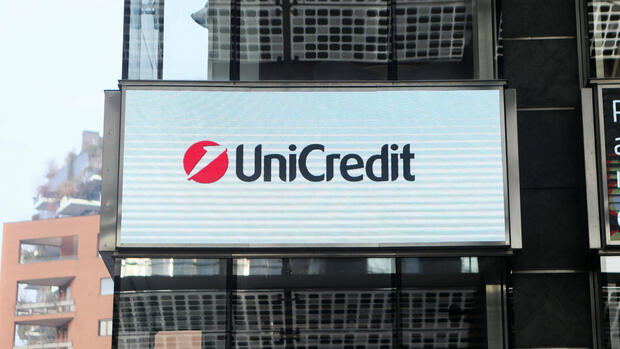Frankfurt, Rome Unicredit has clearly exceeded expectations in the first quarter of this year: the net profit of the major Italian bank rose by 653 percent from January to March compared to the previous year to 2.06 billion euros, as the institute announced on Wednesday. Revenue rose 18.3 percent to 5.93 billion euros.
For the ninth quarter in a row, the bank achieved an “excellent result,” said bank boss Andrea Orcel. It’s also well above analysts’ estimates. According to Bloomberg, they had expected an average net profit of 1.36 billion euros.
In the first quarter, the Hypo-Vereinsbank parent company benefited above all from significantly lower risk provisions and strong interest income. The institute only set aside 93 million euros for loans at risk of default – after 1.2 billion euros in the same quarter of the previous year. Profits have increased almost tenfold compared to the same quarter last year. At that time it was just 274 million euros – because the bank had to write off a large part of its Russian business. “Our liquidity is solid and our asset quality is good,” Orcel said. The financial institution had foreseen a difficult macroeconomic scenario and prepared with “reinforced lines of defense”.
The common equity ratio (CET1) is a very solid 16.05 percent in a European comparison. This is an increase of 2.1 percent compared to the previous year – here, too, financial market experts had shown themselves to be more skeptical in advance.
In terms of interest income, Unicredit, like many of its European competitors, is also benefiting from rising interest rates. The European Central Bank (ECB) last increased the deposit rate that banks receive for their deposits at the central bank to 3.0 percent in March of this year. Interest income rose by almost 44 percent year-on-year to EUR 3.3 billion.
Major bank Unicredit increases forecast for 2023
The institute also increased the forecast for the current year: the bank now expects a net profit of more than 6.5 billion euros. At the beginning of the year, Orcel was still targeting a profit at the level of 2022: 5.2 billion euros.
Investors should also benefit from the result: the bank wants to pay out 5.75 billion euros to shareholders this year. In 2022 it was still 5.25 billion euros, which was already an increase of 40 percent compared to the previous year.
Core countries Germany and Italy also performed strongly in the first quarter of this year. In the home market, the bank’s net profit increased by almost 53 percent compared to the same quarter last year to 956 million euros. The net profit of the German subsidiary Hypo-Vereinsbank (HVB) even increased by almost 80 percent to 513 million euros, while income rose by 10.5 percent to 1.5 billion euros.
The Milan Stock Exchange took the news positively. Unicredit stocks rose 5.6 percent at times on Wednesday afternoon.
Unicredit CEO Orcel: share buybacks instead of M&A deals
Orcel has been running Unicredit for a good two years now. The Italian came with the promise of wanting to make the pan-European banking group more digital, more efficient and bigger. Planned acquisitions, such as that of the nationalized crisis bank Monte dei Paschi di Siena, have failed so far.
In the conference call on the quarterly figures, Orcel slowed down on the subject of acquisitions. In view of the results achieved and expected, the bank sees “much more value in buying back our shares at this level than in an M&A transaction”.
Acquisitions must always be viewed as an instrument for value creation. Although there are currently a number of possibilities: “If we don’t find targets that meet these conditions, we will continue to buy our shares.”
In an interview with the Handelsblatt in September last year, Orcel said that if he had the freedom to choose when it comes to takeovers, he would like to strengthen business outside of Italy. The banking group still makes around 43 percent of its sales on the domestic market. Orcel wants to further diversify the business and make it even more international.
Acquisitions must always be viewed as an instrument for value creation.
(Photo: Bloomberg)
He also wanted to expand the Russian business at the beginning of 2022 – the war in Ukraine was a setback for his plans. The bank is still active in Russia, but has scaled back its activities. The total commitment is currently five billion euros, at the end of last year it was 5.3 billion euros and before the start of the Ukraine war 7.4 billion euros.
The analysts rate the results consistently positive. Citi writes that Unicredit is “one of the best year-to-date banking stocks in Europe.” We expect this outperformance to continue, also due to the “higher return on investment and the still low valuation”. UBS also sticks to its buy recommendation. The numbers are “further proof of the strength” of the bank, whose quarterly profit is 60 percent higher than the estimates of the UBS experts.
More: “Very strong first quarter” – Europe’s banks make more profit
